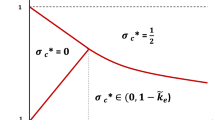Abstract
The theoretical literature on voting behavior has shown that a rational voter may sometimes decide to vote for a candidate or party that does not constitute his or her first preference. Such voters are traditionally called “strategic voters,” in contrast to voters who act sincerely, i.e., those who always vote for their first preference regardless of how others are likely to vote. After discussing some of the problems associated with the definition of these two types of voters and suggesting a new operational definition, some attitudes and characteristics of these two types of voters are investigated. It was found that strategic voters constitute a very small percentage of the entire electorate, that their education level is significantly higher than that of sincere voters, that they tend more often to believe that polls influence voters' decisions and hence tend to delay their own final voting decision, that they tend more often than sincere voters to support small parties but do not tend more often than sincere voters to switch the party they decide to support from one election to the next, and that there is no significant difference between them and sincere voters regarding which governing coalition should/will form following an election.
Similar content being viewed by others
References
Abul-Ela, A. L. A., Greenberg, B. G. and Horvitz, D. G. (1967). A multiproportions randomized response model.Journal of the American Statistical Association 62:990–1008.
Black, D. (1958).The Theory of Committees and Elections. Cambridge: Cambridge University Press.
Brams, S. J. (1975).Game Theory and Politics. New York: Free Press.
Brams, S. J. (1982). Strategic information and voting behavior.Society 19:4–11.
Brams, S. J. (1983). America's unfair elections.The Sciences 23:28–34.
Diskin, A., and Felsenthal, D. S. (1981). Do they lie?International Political Science Review 2:407–422.
Downs, A. (1957).An Economic Theory of Democracy. New York: Harper ⇐p; Row.
Farquharson, R. (1969).Theory of Voting. Oxford: Basil Blackwell.
Felsenthal, D. S. (1979). Aspects of coalition payoffs: The case of Israel.Comparative Political Studies 12:151–168.
Fishburn, P. C. (1973).The Theory of Social Choice. Princeton, N.J.: Princeton University Press.
Fishburn, P. C. (1978). A strategic analysis of non-ranked voting systems.SIAM Journal on Applied Mathematics 35:488–495.
Fishburn, P. C. (1981). An analysis of simple voting systems for electing committees.SIAM Journal on Applied Mathematics 41:499–502.
Gibbard, A. (1973). Manipulation of voting schemes: A general result.Econometrica 41:587–601.
Gibbard, A. (1977). Manipulation of schemes that mix voting with chance.Econometrica 45:665–682.
Greenberg, B. G., Abul-Ela, A. L. A., Simmons, W. R., and Horvitz, D. G. (1969). The unrelated question randomized response model: Theoretical framework.Journal of the American Statistical Association 64:520–538.
Niemi, R. G. (1984). The problem of strategic behavior under approval voting.American Political Science Review 78:952–958.
Niemi, R. G., and Frank, A. Q. (1982). Sophisticated voting under the plurality procedure. In P. C. Ordeshook and K. A. Shepsle (eds.),Political Equilibrium. Boston: Kluwer Nijhoff.
Riker, W. H., and Ordeshook, P. C. (1973).An Introduction to Positive Political Theory. Englewood Cliffs, N.J.: Prentice-Hall.
Sen, A. K. (1970).Collective Choice and Social Welfare. San Francisco: Holden-Day.
Warner, S. L. (1965). Randomized response: A survey technique for eliminating evasive answer bias.Journal of the American Statistical Association 60:63–69.
Author information
Authors and Affiliations
Rights and permissions
About this article
Cite this article
Felsenthal, D.S., Brichta, A. Sincere and strategic voters: An Israeli study. Polit Behav 7, 311–324 (1985). https://doi.org/10.1007/BF00987208
Issue Date:
DOI: https://doi.org/10.1007/BF00987208



